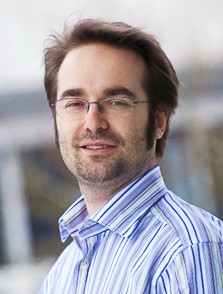No risk, no breakthrough
Congratulations to CRC 1279 project leader Prof. Dr. Martin Plenio! The ‘Deutsche Forschungs-gemeinschaft’ (DFG) recently awarded Prof. Plenio with a Reinhart Koselleck project and will thus support him with about 1.5 million Euro funding within the next five years. A Reinhart Koselleck project, a highly competitive award of the DFG, supports outstanding researchers in executing pioneering projects, which are highly innovative but also risky in a positive sense.
Prof. Plenio is director of the Institute of Theoretical Physics and the Center for Quantum Bio-Sciences at Ulm University. In addition, he leads the Controlled Quantum Dynamics group. Prof. Plenio is an expert in the field of nuclear magnetic resonance (NMR) technologies. NMR is of major importance for many research fields including biology, chemistry, medicine and physics, because it allows to characterize proteins with unprecedented specificity. NMR uses the nuclear spins of atoms, exposed to the magnetic environment present inside an unknown molecule, to characterize its molecular structure. To date, however, the use of NMR in research and diagnostics is limited by relatively poor sensitivity and the fact that relatively large sample sizes are needed for analysis.
In the Reinhart Koselleck project, Prof. Plenio aims to tackle these problems using quantum technologies and develop the theory of new NMR schemes based on color centers in diamonds. These schemes will be optimized to suppress noise during the measurement and at the same time improve the sensitivity of the NMR-signal, hence improving the signal-to-noise ratio. A further important step towards improved sensitivity is the generation of nuclear spin hyperpolarization. Within the color centers of a diamond, it is possible to orient the electron spin of the color center almost perfectly in a specific direction and transfer this polarization to nuclear spins in surrounding molecules. This achieves a hyperpolarized state of the nuclear spins that could potentially exhibit a 100.000 fold increase of the nuclear polarization over its thermal equilibrium and an equal amplification of the NMR signal.
Once successful, the improved NMR techniques would allow the analysis of structural and dynamic characteristics of single proteins in vivo and in vitro. Furthermore, it would enable highly specific chemical analyses of surfaces and facilitate diagnostics through high-throughput molecular fingerprinting on chip-sized NMR devices. To additionally improve the signal-to-noise ratio of the analysis, Prof. Plenio will work in close collaboration with scientist from a plethora of other research fields such as engineers and IT specialists. Most importantly, Prof. Plenio works in close collaboration with Prof. Fedor Jelezko from the Institute of Quantum Optics, who can implement new protocols in his experimental set-up.
The collaborative research of Prof. Plenio and Prof. Jelezko is also part of the research project C06 within the CRC1279.


